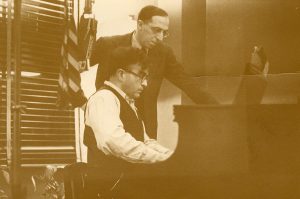Aaron Copland and Carlos Chávez have an odd relationship, most notably in the similarities with their education and career paths. Robert L. Parker states in his article Copland and Chávez: Brothers-in-Arms, “there is no logical reason why their careers should have been so alike,”1 however alike they were and because of those similarities it seems they became each others best friend, at least in their respective music circles. After their initial meeting in the early 1930’s, the two exchanged many letters as well as promoted each others works in their respective countries. It began with Copland through his ten concerts in the Copland-Sessions where Chávez’ works were performed in New York, London, and Paris. Soon after, Chavez accepted a post in Mexico as music director of the Orquesta Sinfónica de México where he was then in the position to return the favor to Copland.
However, for the purposes of this class, the importance of this friendship is about more than their similarities in character, education, and career. In 1934, Chávez wrote the following to Copland,
We had this summer a lot of Honegger, Hindemith, etc. etc. stuff here, and let me tell you that there are simple unbearable for me, that are artificial, full of literature, bad literature, and worse possible taste, I cannot stand them any more, they should shut up for ever, so much the better…
I find this personal comment on European literature rather funny. So much of our conversations in class contribute the sense of “high class” music to European culture and styles. Yet, here Copland and Chávez are seeing it as bad, almost grotesque by Chávez’ description. Chávez goes on to say the following:
… I got the Little Symphony [sic]; and let me tell you what I thought: well, here is the real thing, here is our music, my music, the music of our time, of my taste, of my culture, here it is as a simple and natural fact of my own self, as everything belonging to oneself is simple and natural.2
From this I was able to conclude on two things. One, that Coplands and Chávez’ musical tastes derive from their sense of “American Music.” (I am using this term to categorize both North and Central American Music) Although they live in two different countries, they both derive their music from folk traditions that are geographically very close to one-another. This likely contributed to their distaste in the aforementioned composers pieces.
Two, Chávez makes a very conniving argument on the authenticity of music. So much of our class is trying to define authentic music, understanding that we likely never can. However, when music is composed with respect to the origins of its inspiration, the music belongs to itself, simply and naturally. The physical, educational, or cultural background of the composer is less important when he or she is composing out of respect to their sources. If we can allow of that mindset, then the music begins to define itself, not the composer.
1 Robert L. Parker, Copland and Chávez: Brother-in-Arms (Illinois, University of Illinois Press, 1987), 433.
2 Howard Pollack, Aaron Copland: The Life and Works of an Uncommon Man (New York, Henry Holt and Company, 1999), 222.
Sources
- Parker, Robert L. “Copland and Chávez: Brothers-in-Arms.” American Music 5, no. 4 (1987): 433-44. doi:10.2307/3051451.
- Pollack, Howard. Aaron Copland : The Life and Work of an Uncommon Man. 1st ed. New York: Henry Holt, 1999.
- Schaal, Eric. Aaron Copland and Carlos Chávez. , . Photograph. Retrieved from the Library of Congress, https://www.loc.gov/item/copland.phot0014/. (Accessed November 06, 2017.)

